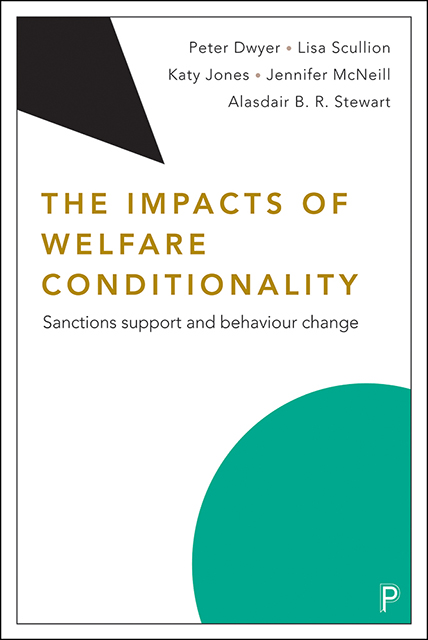Book contents
- Frontmatter
- Contents
- List of figures and tables
- List of abbreviations
- About the authors
- Acknowledgements
- One Introduction
- Two Conditionality in the UK welfare state
- Three Welfare conditionality and behaviour change
- Four From welfare to work? The effectiveness of welfare conditionality in moving people into paid employment
- Five Welfare conditionality and problematic or antisocial behaviour
- Six Unintended outcomes? The wider impacts of compulsion and benefit sanctions in social security
- Seven Ethical debates
- Eight Conclusions
- Methods appendix
- References
- Index
Eight - Conclusions
Published online by Cambridge University Press: 17 June 2023
- Frontmatter
- Contents
- List of figures and tables
- List of abbreviations
- About the authors
- Acknowledgements
- One Introduction
- Two Conditionality in the UK welfare state
- Three Welfare conditionality and behaviour change
- Four From welfare to work? The effectiveness of welfare conditionality in moving people into paid employment
- Five Welfare conditionality and problematic or antisocial behaviour
- Six Unintended outcomes? The wider impacts of compulsion and benefit sanctions in social security
- Seven Ethical debates
- Eight Conclusions
- Methods appendix
- References
- Index
Summary
Within contemporary welfare states a principle of welfare conditionality links eligibility to publicly funded welfare benefits and services to individuals’ acceptance of state-specified compulsory responsibilities or particular patterns of required behaviour. When welfare conditionality is implemented in policy and practice it routinely involves the use of two core elements. First, compulsion, that is, the requirement that certain people mandatorily engage with specified packages of support, typically designed with the intention of moving them off social security benefits and into paid work, or tackling antisocial/ problematic behaviours. Second, the application of various types of sanction for non-compliance. Those people who do not engage as specified face the denial, or loss, of welfare benefits and services as a consequence of their failure to comply.
Internationally, across many and various types of welfare regimes, welfare conditionality has become a key part of the process of welfare reform (for example, Cox, 1998; Dwyer, 2010; Betzelt and Bothfeld, 2011; Baumberg Geiger, 2017). Influenced by New Right thinking (Mead, 1982, 1986), policymakers and governments from across the mainstream political spectrum have become convinced that the instrumental use of various combinations of sanction (sticks) and mandatory support (carrots) can effectively change citizens’ behaviour to reduce ‘welfare dependency’ and promote personal responsibility. In reality this instrumental behaviourism has been largely implemented in response to the conduct and dependency of poorer and marginalised citizens (Dwyer, 1998; Bray et al, 2014; Harrison and Saunders, 2016; Grymonprez et al, 2020) who rely on what Titmuss (1958) identified as ‘social welfare’ benefits and services to meet their needs. Enforcing behaviour change among more wealthy citizens (the consistent beneficiaries of fiscal and occupational welfare) appears to be less of a concern for governments with the preferred mode of behavioural intervention, ‘nudge’ (Thaler and Sunstein, 2008), less directive or potentially punitive.
Welfare states have always sought to promote particular values and specific types of preferred behaviour alongside the meeting of different types of need (Mann, 1992; Dean, 1998). The advance of welfare conditionality across a range of welfare states and policy sectors can be regarded as an attempt to resolve the long-standing tension between care and control, inherent within social welfare (Goroff, 1974; Brown, 2017), firmly in favour of the latter.
- Type
- Chapter
- Information
- The Impacts of Welfare ConditionalitySanctions Support and Behaviour Change, pp. 155 - 160Publisher: Bristol University PressPrint publication year: 2022

